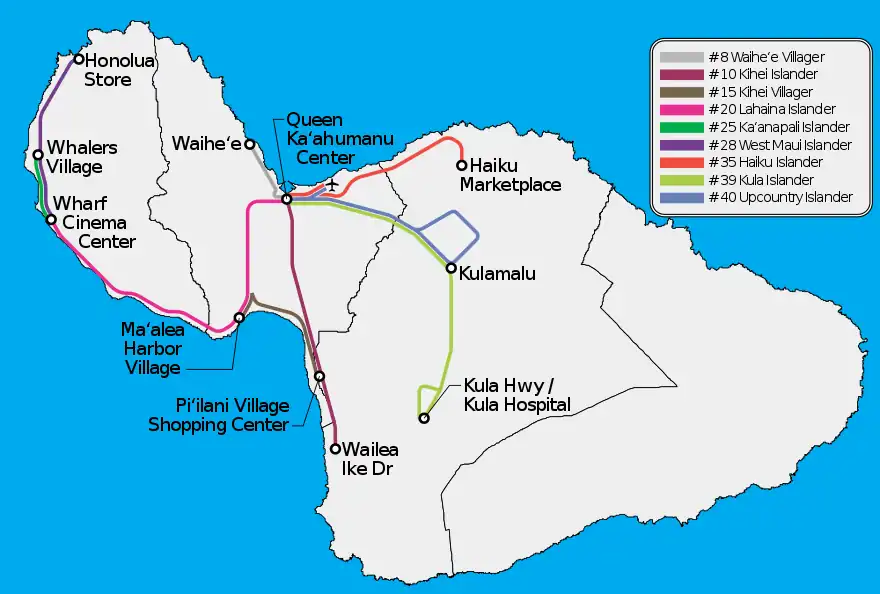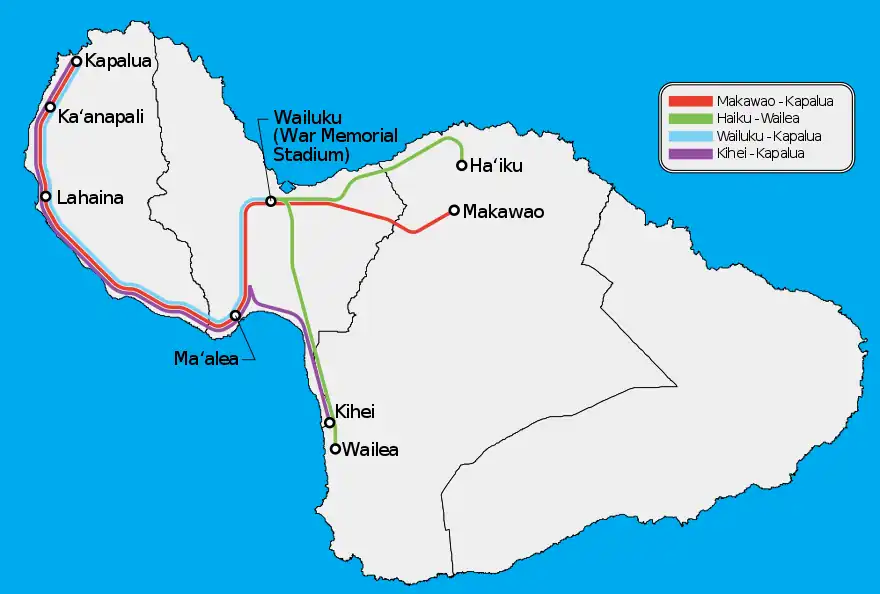Maui Bus
Maui Bus is the public transportation service of the island of Maui, Hawaii, and is operated by Roberts Hawaii under a public-private partnership with Maui County government. They operate 13 regular local bus routes and 4 commuter routes, which have a single early morning run and a return trip in the afternoon and require a reservation.
 | |
 | |
| Parent | Maui County |
|---|---|
| Headquarters | Wailuku, Hawaii |
| Service area | Maui County, Hawaii |
| Service type | bus service, paratransit, express bus service |
| Routes | 12 regular[1] 4 commuter[2] |
| Fuel type | Diesel |
| Operator | Roberts Hawaii |
| Website | Bus Service Information |
History
The first public transit service on Maui started in 1992 with two loop routes in Central Maui operated by the non-profit organization Maui Economic Opportunity (MEO).[3]: 4 These were operated over the same route in opposite directions, offered free of charge with a suggested donation.[3]: 21
The Maui Bus service was started as the Holo Kaʻa service in August 2002 with a joint venture between the private company Akina Aloha Tours, MEO, and the county government in a subsidized joint venture to provide bus service for South, West, and Central Maui.[4] Low ridership (blamed on the lack of advertising for the system) led to Akina Aloha Tours losing $1 million over the following two years.[5]
Service was reduced in July 2004 to five transit routes: three operated by Roberts Hawaii, one by Akina Aloha Tours (privately financed), and the one bidirectional route by MEO.[3]: 4, 19 The Roberts routes were named Routes A, B, and C: Route A operated between Maʻalea Harbor Village and the Shops at Wailea via Kihei [which is now Route #15]; Route B connected Kahului to Wharf Cinema Center (in Lahaina) via Maʻalea [now Route #20]; and Route C connected the Queen Kaʻahumanu Center with the Shops at Wailea [now Route #10].[3]: 21 The MEO routes served Central Maui (Wailuku and Kahului) with a loop route operated in opposite directions [now Routes #1/2 and #5/6].[3]: 21 The Akina Aloha route operated between Kaʻanapali and Lahaina [now Route #28].[3]: 22 [6]: ES-1
The Short Range Transit Plan (SRTP) published in January 2005 evaluated contemporary demand and service conditions and developed the current fixed routes, including the expansion of service to Upcountry Maui.[3]: 58–66 The 2005 SRTP also developed the branding and logo of Maui Bus,[3]: 89–91 which began operations in 2006; the fixed and commuter routes are operated by Roberts Hawaii, while the paratransit services are operated by MEO.[6]: ES-1 Ridership rose sharply over the ten years between 2002 and 2012, from less than 200,000 (annual passengers) to more than 2,500,000.[6]: ES-2, ES-3
Service
The current Maui Bus service includes 13 fixed routes,[1][7] 4 commuter routes,[2] and a paratransit program that provides curb-to-curb service with advance reservations,[8] serving western, central, and southern communities, including Wailuku, Kahului, Lahaina, Haiku, Kula, and Upcountry Maui.
Fixed routes
The Central Maui System includes the routes numbered with a single digit.[6]: ES-5 The (southern) Kihei Route System includes routes numbered in the 10s.[6]: ES-13 The (western) Lahaina, Kaʻanapali and Napili Route System includes routes numbered in the 20s.[6]: ES-17 The Upcountry Route System includes routes numbered in the 30s, including #40.[6]: ES-18 On average, 6,500 passengers board the Maui Bus fixed-route system, with an average per-passenger trip cost of $2.47.[6]: 2–9
For fixed-route service, Loop services operate within Central Maui, Villager services are routes that circulate within a single community (Lahaina, Kihei, and Kula), and Islander services are longer routes that connect different communities to Central Maui.[6]: 2–2 Most of the Islander routes connect at a privately-owned site at the Queen Kaʻahumanu Center shopping mall in Kahului,[6]: ES-25 where transfers can be made to other Islander routes or the local Loop/Villager routes. Other significant transfer and boarding sites include Wharf Cinema Center, Whalers Village, Piʻilani Village Shopping Center, and War Memorial Stadium.[6]: ES-26 The War Memorial Stadium site is used as a park-and-ride or drop-off location for three of the four commuter routes.[6]: 2–3
Both the Kahului and Wailuku Loops are bidirectionally operated over the same routes: #1 (Wailuku Loop) and #6 (Kahului) operate clockwise, while #2 (Waikluki) and #5 (Kahului) operate counter-clockwise.[9] Officially, #2 and #6 are the reverse routes.[6]: 2–2
 | ||||
| Regular Routes[1][9] | ||||
|---|---|---|---|---|
| No. | Name | Description | Service Hours | Headway |
| 1/2 | Wailuku Loop | Kahului-Wailuku (not shown on map) | 6:30 a.m. – 8:30 p.m. | 60 min |
| 5/6 | Kahului Loop | Kahului (not shown on map) | 6:30 a.m. – 8:30 p.m. | 60 min |
| 8 | Waiheʻe Villager | Kahului-Waiheʻe | 7:15 a.m. – 8:00 p.m. | 180 min |
| 10 | Kihei Islander | Kahului-Maalaea-Kihei-Wailea | 5:30 a.m. – 7:30 p.m. | 60 min |
| 15 | Kihei Villager | Maalaea-Kihei | 6:05 a.m. – 8:05 p.m. | 60 min |
| 20 *SUSPENDED UNTIL FURTHER NOTICE* | Lahaina Islander | Kahului-Wailuku-Maalaea-Lahaina | 5:30 a.m. – 7:30 p.m. | 60 min |
| 23 *SUSPENDED UNTIL FURTHER NOTICE* | Lahaina Villager | Lahaina (not shown on map) | 8:00 a.m. – 10:00 p.m. | 60 min |
| 25 *SUSPENDED UNTIL FURTHER NOTICE* | Kaʻanapali Islander | Lahaina-Kaʻanapali | 2:30 p.m. – 5:00 p.m. | 60 min |
| 28 *SUSPENDED UNTIL FURTHER NOTICE* | West Maui Islander | Lahaina-Kaʻanapali-Kapalua | 5:30 a.m. – 8:30 p.m. | 60 min |
| 29 | West Maui Express | Kahului-Lahaina-Kaʻanapali-Kapalua | 5:00 a.m. – 9:00 p.m. | 60 min |
| 35 | Haiku Islander | Kahului-Paʻia-Haiku | 5:30 a.m. – 8:30 p.m. | 90 min |
| 39 | Kula Islander | Pukalani-Kula-Makawao | 7:00 a.m. – 9:00 p.m. | 90 min |
| 40 | Upcountry Islander | Kahului-Pukalani-Makawao-Haliʻimaile | 6:00 a.m. – 9:00 p.m. | 90 min |
Commuter routes
Commuter routes are named for the termini, listed in order of morning origin and destination, respectively. For the afternoon commute, the route is reversed. Three of the four commuter routes meet in Wailuku at War Memorial Stadium. Three of the four bring commuters to the Kapalua/Napili/Kaʻanapali area in the morning. Only one commuter route operates more than once per day.[6]: 2–3
During the COVID-19 pandemic, commuter service was reduced in response to a decrease in ridership.[2]
 | |||||
| Commuter Routes[2] | |||||
|---|---|---|---|---|---|
| No. | Name | Origin (AM) | Destination (AM) | Service Hours | Trips |
| Destination (PM) | Origin (PM) | ||||
| 80 | Haiku – Wailea | Haiku (Haiku Community Center) | Wailea (Hotels) | 5:30 am; 4:30 pm | 1 |
| 81 | Kihei – Kapalua | Kihei (Kilohana St & S Kihei Rd) | Kapalua / Napili | 6:00 am; 4:05 pm | 1 |
| 82 | Makawao – Kapalua | Makawao (Eddie Tam Gym) | 5:30 am; 4:05 pm | 1 | |
| 83 | Wailuku – Kapalua | Wailuku (War Memorial Stadium) | 5:30–6:45 am; 3:05–4:30 pm | 4[lower-alpha 1][lower-alpha 2] | |
- Notes
- 15–45 minute headways
- One of the afternoon return trips departs from Kaʻanapali at 4:15 pm instead of Kapalua.
Former and proposed fixed routes
Neither of the fixed-route loops in Central Maui serve Kahului Airport, and the long headways on the two Upcountry routes that do (#35 and #40) led to the recommendation to add direct service between Wailuku and the airport.[6]: 4–17, 4–24
| Former and Proposed Routes[6] | ||||
|---|---|---|---|---|
| No. | Name | Description | Service Hours | Headway |
| 3/4 | Wailuku-Airport | Kahului Airport-Wailuku[6]: ES-8, ES-9 | 6:30 a.m. to 10:00 p.m. | 30–60 min[lower-alpha 1] |
| 7 | Wailuku Central | Wailuku[6]: ES-9 | 6:30 a.m. to 8:00 p.m. | 30–60 min[lower-alpha 1] |
| 9 | Maui Business Park | Kahului[6]: ES-12 | 6:30 a.m. to 10:00 p.m. | 30–60 min[lower-alpha 1] |
| 15A | North Kihei Villager | Maʻalea–Kihei[6]: ES-14 | 5:30 a.m. to 9:00 p.m. | 60 min |
| 15B | South Kihei Villager | Kihei[6]: ES-16 | 5:30 a.m. to 9:00 p.m. | 60 min |
| 23A | Lahaina Villager | Lahianaluna[6]: ES-16 | 7:00 a.m. to 11:00 p.m. | 60 min |
| 23B | Lahaina Villager | Lahaina Civic Center[6]: ES-16 | 7:30 a.m. to 10:30 p.m. | 60 min |
| 38 | Paʻia Town-Makawao Villager | Paʻia–Makawao[6]: ES-21 | 8:00 a.m. to 9:30 p.m. | 90 min |
- Notes
- Shorter headways during peak commute hours
Fleet
 ElDorado Aero Elite Bus.
ElDorado Aero Elite Bus. ElDorado Aero Elite bus
ElDorado Aero Elite bus
| Year | Qty | Image | Make | Model | Capacity | Lift or Ramp | Wheelchair Tie-downs | Notes |
|---|---|---|---|---|---|---|---|---|
| 2008 | 7 |  |
ElDorado National | E-Z Rider II | 37 | Ramp | 4 | |
| 2010 | 5 |  |
||||||
| 2014 | 10 |  |
ElDorado National | AXESS | 32 | Ramp | 2 | |
| 2015 | 4 |  |
ElDorado National | Aero Elite | 25 | Lift | 2 | |
| 2019 | 2 |  |
ElDorado National | AXESS BRT | 32 | Ramp | 2 | |
| 2020 | 4 | 32 | Ramp | 2 |
| Year | Qty | Image | Make | Model | Capacity | Lift or Ramp | Wheelchair Tie-downs | Notes |
|---|---|---|---|---|---|---|---|---|
| 2004 | 1 | Alexander Dennis | Enviro500 | 81 | Ramp | 2 | ||
| 2007 | 6 |  |
ElDorado National | AXESS | 41 | Ramp | 2 |
Retired in 2020 |
| 2011 | 1 | ElDorado National | Aero Elite | 25 | Lift | 2 | ||
| 2013 | 1 | ARBOC | Spirit of Mobility | 17 | Ramp | 4 |
Fares
Cash fares are $2.00 per person per boarding. No transfers are given, but a day pass, at $4.00 per person, is valid on all routes. An all-route monthly pass is available at a cost of $45.00, with a reduced rate for students and seniors of $30.00.[1]
Facilities
Because the County of Maui uses contracted operators for the Maui Bus service, the County-owned buses are operated and maintained by its contractors and the Maui Department of Transportation does not have a dedicated facility to store, refuel, and maintain the buses.[11]: 3, 40a However, in 2013, the County purchased an undeveloped 309-acre (125 ha) site in Waikapu with plans to consolidate existing garage and yard facilities for other County departments with a new bus yard.[11]: ii The proposed bus yard would be a 10-acre (4.0 ha) parcel at Waikapu, to be operated by a single private contractor, with space to park 100 buses (expandable to 150) and five to ten maintenance bays.[11]: 40a, 40b The site lies east of a proposed extension to Waiale Road, west of Kuihelani Highway.[11]: 136
The existing fixed-route services use Queen Kaʻahumanu Center (QKC) as a hub and transfer point; the privately-owned shopping center notified the County of Maui in 2017 that it would not renew its lease and the buses would be forced to vacate the site by 2020.[12][13] Plans are underway to develop a 0.85-acre (0.34 ha) site next to QKC, near the Kahului Public Library at Vevau and School, as the Central Maui Transit Hub.[12][14]
MEO operates a transportation facility in Puʻunene.[11]: 40a
References
- "Maui Bus Public Transit System". County of Maui. Retrieved 11 January 2021.
- "Maui Bus Commuter Service". County of Maui. Retrieved 11 January 2021.
- Urbitran (January 2005). Maui County Short Range Transit Plan (Report). Maui County Department of Transportation. Retrieved 13 January 2021.
- Bernardo, Rosemarie (August 23, 2002), "Joint venture to start Maui bus service", Honolulu Star-Bulletin, retrieved 2009-08-23
- Kubota, Gary T. (June 15, 2004), "Maui subsidized bus plan could be out of gas", Honolulu Star-Bulletin, retrieved 2009-08-23
- SSFM International; Weslin Consulting Services, Inc.; Pacific Cartography (April 2016). Maui Short Range Transit Plan (PDF) (Report). County of Maui. Retrieved 11 January 2021.
- "Maui Bus Route Maps". County of Maui. Retrieved 11 January 2021.
- "Maui Bus ADA Paratransit Program". County of Maui. Retrieved 11 January 2021.
- "Maui County Bus Schedule". County of Maui. Retrieved 11 January 2021.
- "Maui Bus - CPTDB Wiki".
- Waikapu Facilities Master Plan, Addendum 1 (Report). County of Maui. April 2017. Retrieved 14 January 2021.
- Cerizo, Kehaulani (July 22, 2019). "Early designs unveiled for Kahului transit hub". The Maui News. Retrieved 14 January 2021.
- "Capital Improvement Program: Central Maui Transit Hub". County of Maui, Department of Transportation. Retrieved 14 January 2021.
- "Urban Design Review Board, Regular Meeting Minutes". County of Maui. July 2, 2019. Retrieved 14 January 2021.
External links
- County of Maui official page
- "Maui Bus". Canadian Public Transit Discussion Board Wiki. Retrieved 12 January 2021.